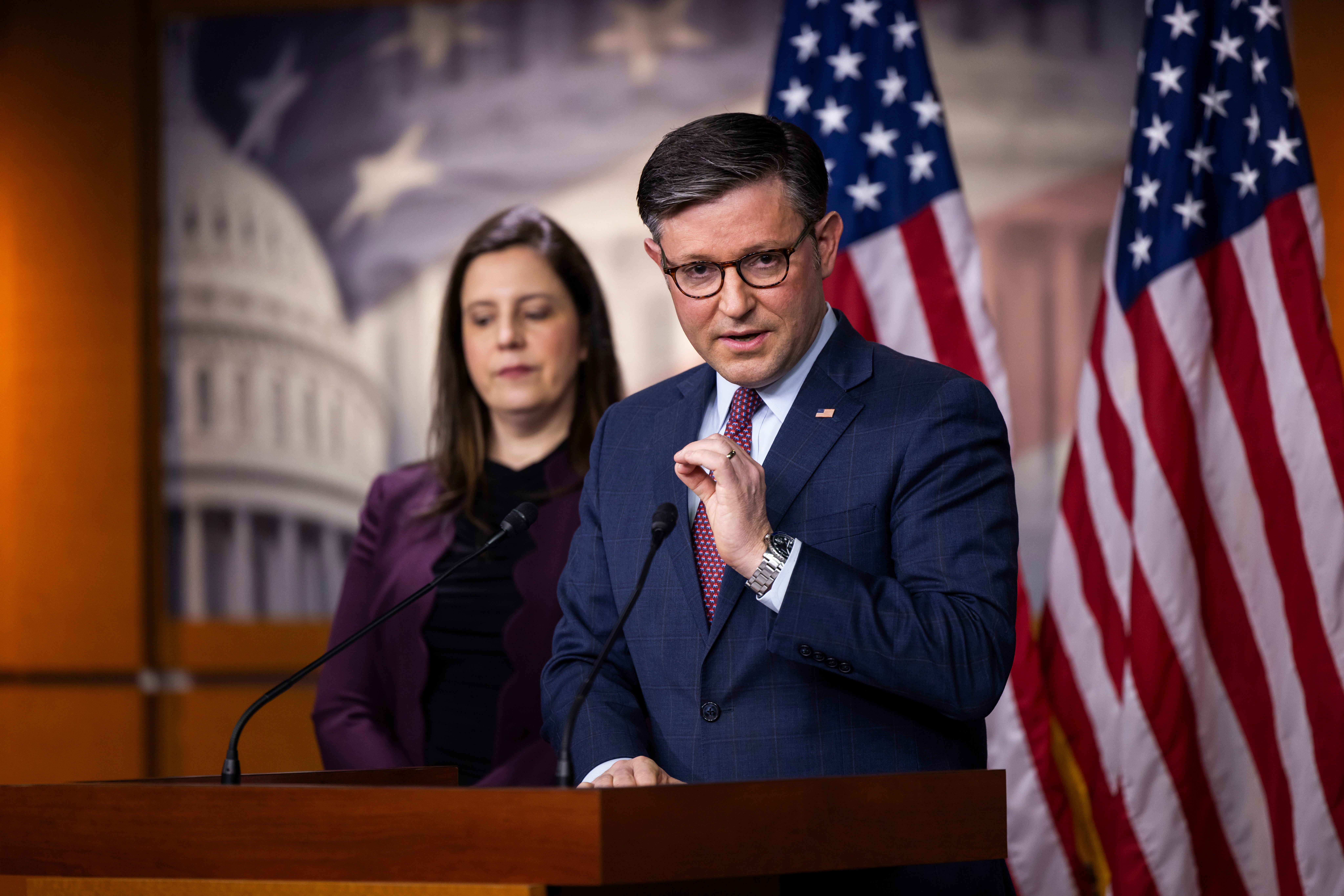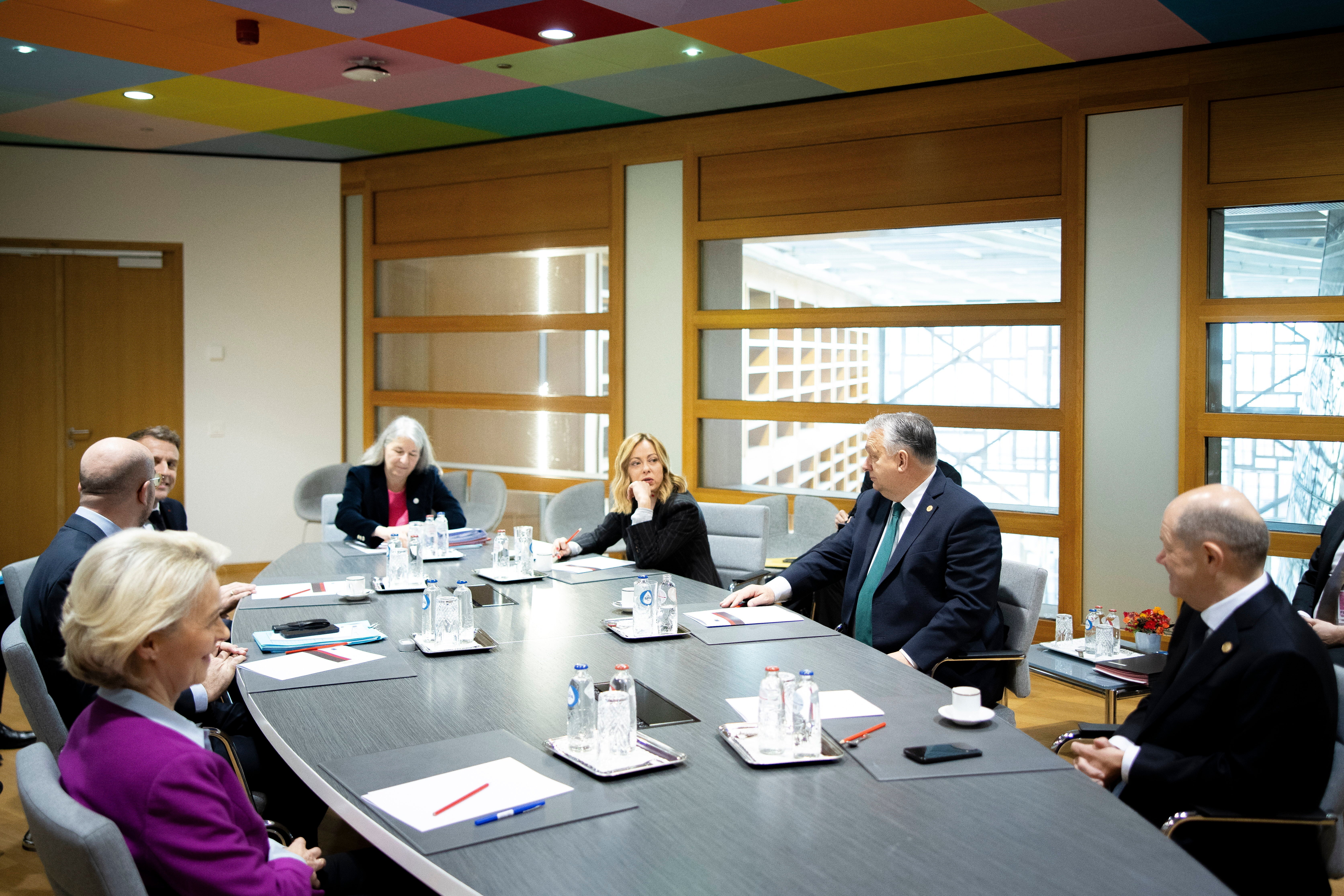EU agrees £43bn of vital aid to Ukraine after Hungary’s Orban finally bows to pressure
The Hungarian prime minister had been the sole holdout for weeks
Your support helps us to tell the story
From reproductive rights to climate change to Big Tech, The Independent is on the ground when the story is developing. Whether it's investigating the financials of Elon Musk's pro-Trump PAC or producing our latest documentary, 'The A Word', which shines a light on the American women fighting for reproductive rights, we know how important it is to parse out the facts from the messaging.
At such a critical moment in US history, we need reporters on the ground. Your donation allows us to keep sending journalists to speak to both sides of the story.
The Independent is trusted by Americans across the entire political spectrum. And unlike many other quality news outlets, we choose not to lock Americans out of our reporting and analysis with paywalls. We believe quality journalism should be available to everyone, paid for by those who can afford it.
Your support makes all the difference.The European Union has agreed a vital €50bn (£43bn) aid package to Ukraine after the bloc’s top leaders broke through the opposition of Hungary’s prime minister Viktor Orban following weeks of stalemate.
Mr Orban, the closest ally Russian president Vladimir Putin has within the EU, has questioned the idea of committing years worth of funding to Kyiv despite unanimous support from the other 26 EU states. The Hungarian leader had previously blocked an agreement in December, but the pressure from other leaders finally broke his opposition and a deal was announced soon after the summit beginning.
“We have a deal,” Charles Michel, the European Council president wrote on Twitter/X, just five minutes after the summit officially began.
“All 27 leaders agreed on an additional €50bn support package for Ukraine within the EU budget. This locks in steadfast, long-term, predictable funding for Ukraine.
“The EU is taking leadership and responsibility in support for Ukraine; we know what is at stake.”
With the US – the largest single supplier of military aid to Kyiv – struggling to sign $60bn (£47bn) of fresh funding thanks to strong resistance from Donald Trump-supporting Republicans in Congress, pressure had been building on EU leaders to back up their strong words over steadfast support for Kyiv with action, particularly as Ukrainian forces have spoken of shortages of ammunition and weaponry on the front line. The tone was set by Polish prime minister Donald Tusk, who was asked what he would say to Mr Orban while on his way to the summit. “Nothing nice,” was his brief response.
Mr Orban sat down with the European Union’s five most powerful leaders – including Mr Michel, European Commission leader Ursula von der Leyen, French president Emmanuel Macron, German chancellor Olaf Scholz and Italian prime minister Giorgia Meloni – ahead of the summit. The speed with which the deal was signed off once the summit began suggests that this was where Mr Orban realised he had run out of road.
“[Orban] tried to raise his bets as high as possible. But I’m not sure he got much,” Sebastien Maillard, an associate fellow of the Europe Programme at the Chatham House think tank, said.

The EU aid, known as the Ukraine Facility, will help cover Kyiv’s needs for 2024 to 2027. It includes €33bn in cheap loans and €17bn in grants from the bloc’s budget to give Ukraine stable financing as it fights off Russia’s invasion. It is not strictly a military package, although Western loans and grants help maintain internationally-supplied arms. It will also help fill any gaps in Ukraine’s budget as money has been pushed towards the war effort, such as salaries for public servants. It also means that Kyiv will not face the requirement to divert funds away from military efforts to support other wider societal needs. The first €4.5bn is expected to arrive in March.
Ukrainian president Volodymyr Zelensky thanked the EU for its “very important decision” but called for more military assistance, particularly the provision of artillery shells.
“It is very important that the decision was made by all 27 leaders, which once again proves strong EU unity,” Mr Zelensky said. “Unfortunately, the implementation of the European plan to supply one million artillery shells to Ukraine is being delayed.”
On Wednesday, the EU’s top foreign policy chief said they hoped to have 52 per cent of the shells they promised to Ukraine last year by the end of 2024.
EU leaders stressed an “urgent need” to accelerate the delivery of ammunition and missiles to Ukraine in a statement after Mr Zelensky’s remarks.
Ukraine’s top diplomat, Dmytro Kuleba, described the EU package as one of “historic proportions”, adding that it showed that talk of war fatigue among Kyiv’s backers was “simply false”.
“This is a step of historic proportions. It demonstrates that any talk about alleged ‘fatigue’ or ‘waning support’ is simply false.
“Europe has once again demonstrated its strength and ability to make major decisions independent of others. The EU is leading the way and setting an example for the rest of the world to follow.”
Mr Maillard said he believed the EU passing their bill now puts increased pressure on US Congress to finally reach their own deal.
Republicans have proved equally obstinate in the face of the Joe Biden administration’s attempts to pass a new military support package to Ukraine, which has been blocked since last October in Congress. Negotiations on linking policy changes over migration at the US southern border with wartime aid for Kyiv – with the aim of unlocking Republican support – continue.
“The fact that the EU has delivered definitely puts pressure on Congress,” Mr Maillard said. “If the EU had failed, it would have put less political pressure on the US.

“The message from Brussels today is: ‘Now it’s your turn Washington’.”
Mr Orban was well aware that the EU support package for Kyiv required unanimity to be passed – and the bloc’s leaders arrived this morning nervous to finally push through a deal that was first proposed in June last year. The Hungarian leader, who met with Putin last October in Beijing, had been expected to provide tough resistance again.
Diplomats told Reuters that, in exchange for the green light from Hungary for the Ukraine aid, the bloc did not commit to releasing any of the billions of euros of EU funds intended for Hungary but frozen by Brussels over concerns about human rights and the rule of law in the country. They said the aid deal included a yearly discussion of the package and the option to review it in two years "if needed", but no clear veto right for Budapest.

Mr Maillard said the two-year review would allow the EU to suspend or freeze additional money but it would not allow the bloc to cancel the funding – a power that Hungary had hoped to wield going forwards.
Mr Orban tried to spin the results of the summit. Hungary accepted the deal with conditions that withheld EU funds from Hungary will not end up in Ukraine and that Ukrainian aid will be used sensibly, the leader said. But his remarks bear little relation to what other EU leaders said was agreed.
Multiple attempts to convince Hungary to give its consent had failed over the past few months as EU leaders explored progressively more extreme ways of winning Budapest over.
EU diplomats told Politico last week that if Mr Orban blocked Ukraine aid again during the meeting on Thursday, Brussels could look to invoke Article 7, the most serious political sanction on a member country that involves suspending its right to vote on EU decisions.
On Sunday, a plan was leaked to the Financial Times detailing an EU idea to strong-arm Hungary into approving the bill by threatening to permanently shut off all funding to Budapest. Mr Orban described the plan as “blackmail”.
Kaja Kallas, the Estonian leader, a staunch supporter of Ukraine, made portentous comments about the state of Hungary’s economy this morning when asked about her hopes of a deal, in a thinly-veiled reference to this plan.
“If you look at the economy of Hungary... the interest rate of their central bank is 9 per cent, that shows how well his economy is going,” she said. “Hungary needs Europe, so he should also look into what is in it for Hungary, being in Europe."

Join our commenting forum
Join thought-provoking conversations, follow other Independent readers and see their replies
Comments